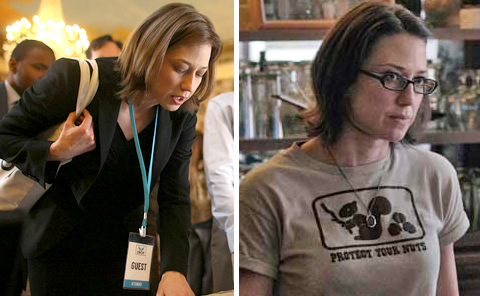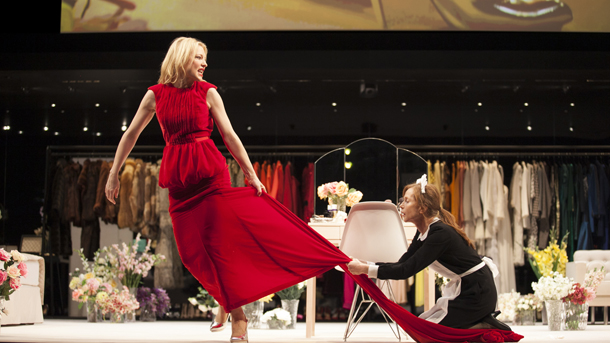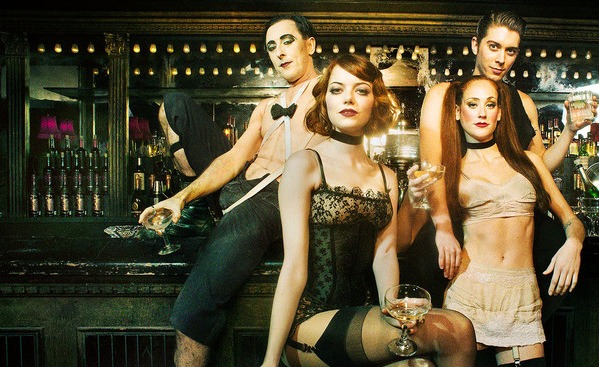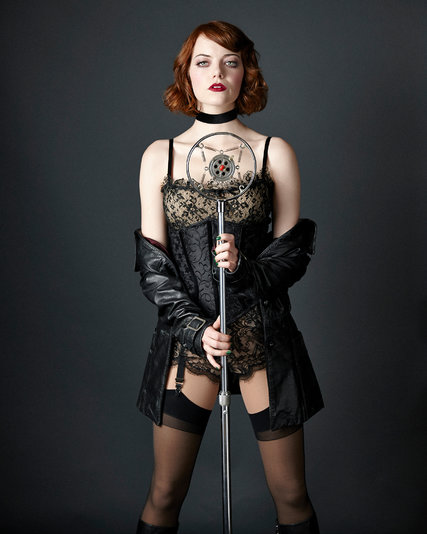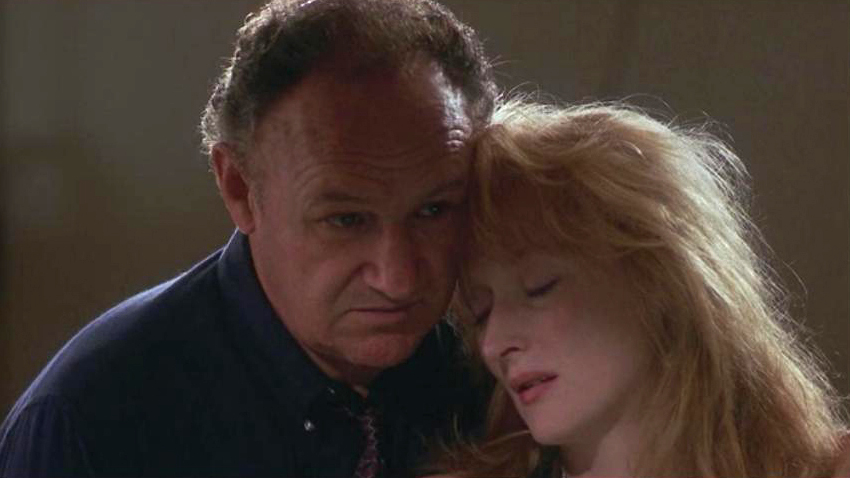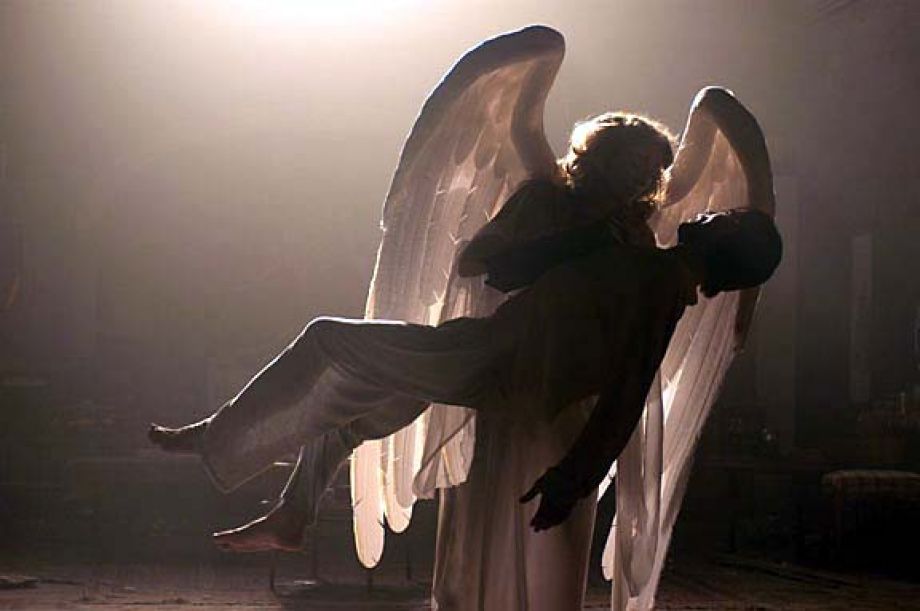New Series! In Quick Impressions we'll be looking at the working actor in key movie scenes. Consider it a celebration of SAG card-holders everywhere and free advice for casting directors for people who aren't famous ...in some cases "yet". So many showbiz dreams wander around on every film set and are embedded in each frame of your favorite movies.
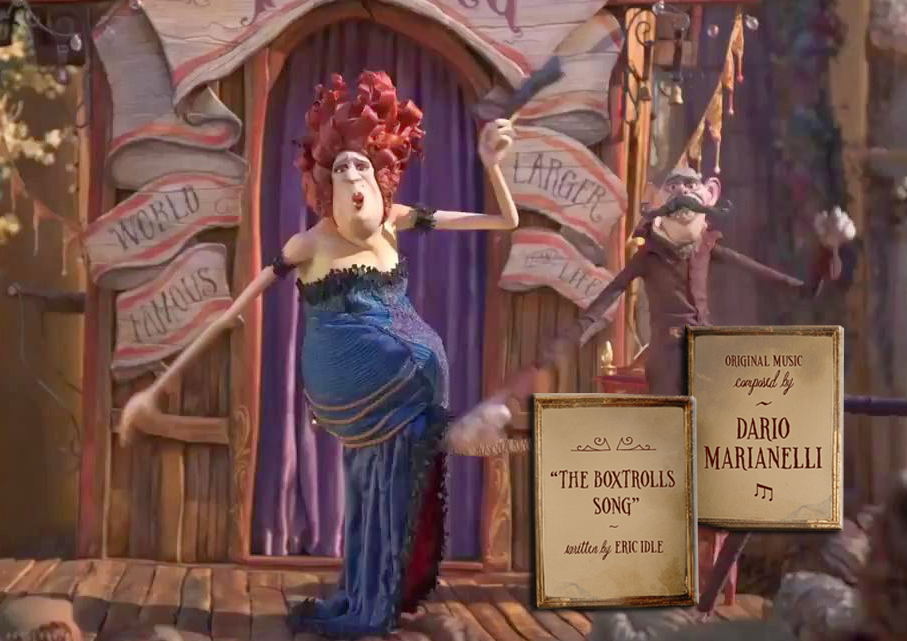
Today, we're talking to actor Sean Patrick Doyle who sings the title song in The Boxtrolls in that great scene when Madame Frou-Frou takes the stage. Sir Ben Kingsley is the voice of Archibald Snatcher / Madame Frou-Frou so Sean Patrick makes like a modern day Marni Nixon.
NATHANIEL: What is that process of "voice matching" and how did you get the part - it's so different from your other credits.

SEAN PATRICK DOYLE: A cockney villain posing as a female Czechoslovakian show hall performer? - different indeed! Laika had auditioned many actors in LA but Heather Vergo at Atlas Talent put a call out to their commercial office in New York, seeking performers who could interpret the song but still voice match. My commercial agent Michael had seen me perform a soprano aria in the Broadway revival of La Cage Aux Folles. He also knew that imitating famous singers is my party trick of choice.
I signed a few confidentiality documents, but was never told that the spoken recordings I was listening to were Sir Ben Kingsley. A week or so later, there was a bite at the line giving me feedback on my audition track and a slew of references to listen to before re-recording: Mae West, Edith Piaf, British Show Hall performers. They also requested that I roughen up my sound a bit. Dario Marianelli [The Oscar-winning composer] had done some digging online and turned up a video of me playing Fruma-Sarah in the 2008-09 National Tour of Fiddler on the Roof. He was tickled that they had cast a male in the role for the first time, and advised “a little more of that wouldn’t hurt.”
Because I was doing a show here in New York, director Anthony Stacci and producer David Ichioka flew in from the West Coast. Co-director Graham Annable listened in from Portland and Dario from a studio in London. It was collaboration across many time zones!
NATHANIEL: It payed off. The song/scene is amazing. Did you know what it would look like?
SEAN PATRICK DOYLE: I was sent an animatic, which is a moving storyboard with rough sketches of the characters and their movement, along with the spoken voice performances in the Cheesebridge Fair scene. When we recorded, the producers put up renderings of Snatcher and Frou Frou in the booth and also showed me footage of Ben recording his tracks in a lounge chair. When seeing the movie, the real surprise was that they had turned it into a full production number, using live choreographed dancers to aid the animators. They also had Mark Orton re-orchestrate the song with Portland band Loch Lomond, and bent some of the higher operatic notes (the ending note was originally a soprano A), so it sounded slightly different, too. I think the finished product is very clever, and fits Ben’s colorful spoken performance.
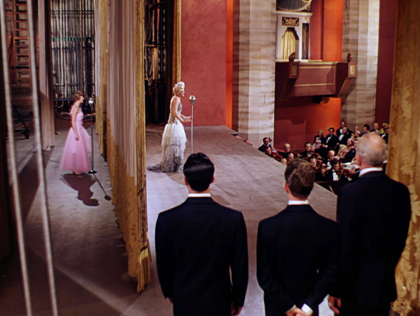 NATHANIEL: Proposal: If the song is nominated for an Oscar, You and Ben Kingsley do the number in full drag. He stands at the microphone and you are behind him as a curtain opens up, the Kathy Selden to his Lina Lamont.
NATHANIEL: Proposal: If the song is nominated for an Oscar, You and Ben Kingsley do the number in full drag. He stands at the microphone and you are behind him as a curtain opens up, the Kathy Selden to his Lina Lamont.
SEAN PATRICK DOYLE: It might take some convincing to get Sir Kingsley into a frock, but, hey, sign me up! I know the Academy often favors a pop sound, but I’d be very happy to see Eric Idle’s cheeky lyrics and Weill-esque melody recognized on that level.
NATHANIEL: Speaking of frocks, First La Cage and now you're onstage in Kinky Boots (such a fun show!). So should we expect to see you next season on RuPaul's Drag Race?
SEAN PATRICK DOYLE: Haha! Well, as much as I love watching those queens battle it out, the fulfillment I get from gender-bending roles comes solely from being able to play a character wildly different from myself. Recently I was playing nebbishy Eugene in Grease at Paper Mill Playhouse, and I just filmed an episode as a heroin addict in the final season of Nurse Jackie. The further I step away from myself, the more fun the work becomes. But as a lithe countertenor weighing in at a buck twenty, a few of my bigger jobs have involved elements of gender illusion. It’s not in every actor’s skill set and I’ve used that to my advantage, but of course the goal is always to do really varied, interesting work! Still, let me tell ya - it takes a real man to pump across a Broadway stage wearing a bikini and 7 1/2 inch heels. Come to the Hirschfeld and I’ll show you!

The Boxtrolls will be released digitally on Dec 23rd with the DVD/BluRay release on January 20th, 2015. You can follow Sean Patrick on twitter here. He is currently on stage as "Angel" in Kinky Boots (in the top hat and red coat, third from right by football star Michael Sam below). You can also listen to Sean Patrick's insane voice reel below if you're interested.
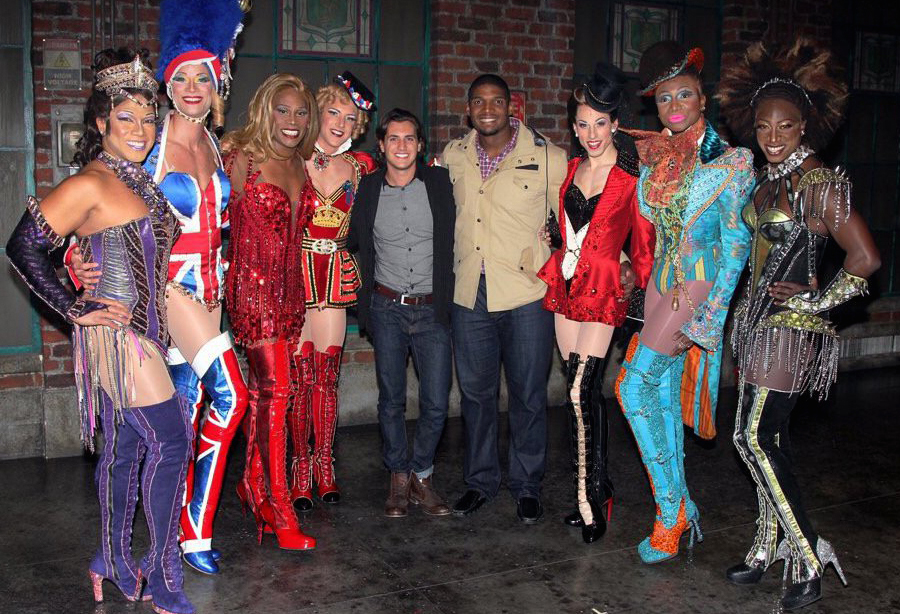
Previously: "Nervous Intern" in Gone Girl
Next Tuesday: American Horror Story: Freakshow
 Wednesday, December 10, 2014 at 6:00PM
Wednesday, December 10, 2014 at 6:00PM  Carrie Coon at the premiere of Gone Girl in NYCActors who can register potently in all three acting mediums are less common than you'd think. Some movie stars are duds on stage (and vice versa) and, though it's becoming less of an issue as mediums shift and even merge, you can sometimes spot noticeable scale shifts in charisma in the actors who jump back and forth between TV and film as if one is the place they were born to live in and the other a nice place to visit. The lines may be blurring as more and more actors make a habit of doing all three but some actors seem right everywhere. It's not the medium but the acting itself that's their true home.
Carrie Coon at the premiere of Gone Girl in NYCActors who can register potently in all three acting mediums are less common than you'd think. Some movie stars are duds on stage (and vice versa) and, though it's becoming less of an issue as mediums shift and even merge, you can sometimes spot noticeable scale shifts in charisma in the actors who jump back and forth between TV and film as if one is the place they were born to live in and the other a nice place to visit. The lines may be blurring as more and more actors make a habit of doing all three but some actors seem right everywhere. It's not the medium but the acting itself that's their true home.